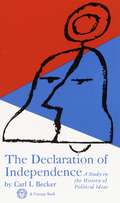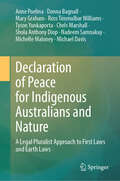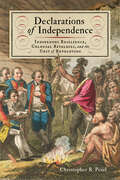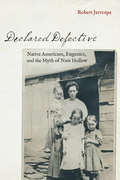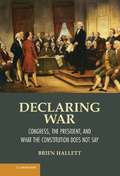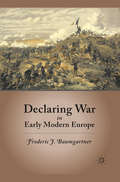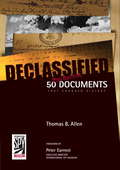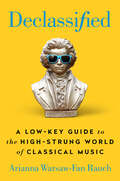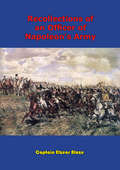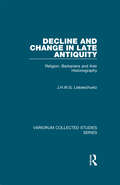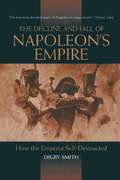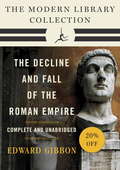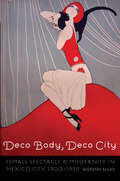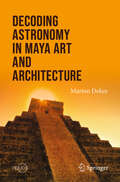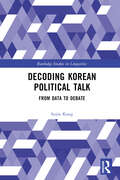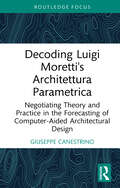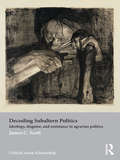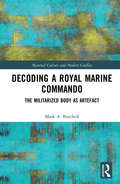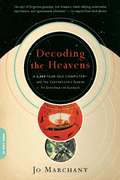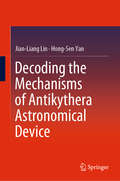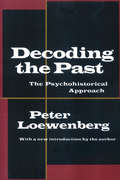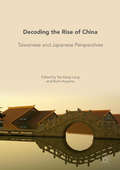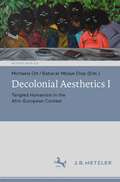- Table View
- List View
Declaration of Independence: A Study in the History of Political Ideas
by Carl L. BeckerThe Declaration of IndependenceCarl L. Becker's important study is an analysis of the concepts expressed in the Declaration. Here is a lucid explanation of what the Declaration really is, what views it sets forth, where those views arose, and how they have been accepted or modified by succeeding generations. A book that every American should read.
Declaration of Peace for Indigenous Australians and Nature: A Legal Pluralist Approach to First Laws and Earth Laws
by Michael Davis Mary Graham Michelle Maloney Tyson Yunkaporta Anne Poelina Donna Bagnall Ross Timmulbar Williams Chels Marshall Shola Anthony Diop Nadeem SamnakayThis groundbreaking book delves into the lived experiences and collective wisdom of Indigenous communities impacted by colonialism. Through collaborations with non-Indigenous colleagues, this book seeks to inform current legal practices and advocate for a transformative shift toward justice, equity, and the recognition of First Law and Earth-centered law.By presenting Indigenous stories as case studies and incorporating the collective wisdom gained through extensive discussions and exchanges with non-Indigenous colleagues, the authors highlight the ways in which Australian law falls short in upholding holistic principles and fails to align with First Law and Earth-centered law. The book invites readers to consider alternative legal futures that are rooted in respect, justice, and the well-being of both Indigenous peoples and the natural environment. Through its thought-provoking analysis, literature reviews, and insights from Indigenous leaders, this book servesas a powerful resource for legal practitioners, policymakers, scholars, and anyone passionate about social justice and environmental sustainability. The book aims to ignite meaningful dialogue and inspire concrete actions to address the historical injustices faced by Indigenous peoples while fostering a more inclusive and equitable legal framework for the generations to come.
Declarations of Independence: Indigenous Resilience, Colonial Rivalries, and the Cost of Revolution (The Revolutionary Age)
by Christopher R. PearlHow Indigenous Americans and colonial settlers negotiated the meaning of independence in the Revolutionary era On July 4, 1776, two hundred miles northwest of Philadelphia, on Indigenous land along the West Branch of the Susquehanna River, a group of colonial squatters declared their independence. They were not alone in their efforts. This bold symbolic gesture was just a small part of a much broader and longer struggle in the Northern Susquehanna River Valley, where diverse peoples, especially Indigenous nations, fought tenaciously to safeguard their lands, sovereignty, and survival. This book immerses readers in that intense, decades-long struggle. By intertwining the experiences of Indigenous Americans, rebellious colonial squatters, opportunistic land speculators, and imperial government agents, Christopher Pearl reveals how conflicts within and between them all set the terms and ultimately shaped the meaning of the American Revolution. In the crucible of this conflict, memories, histories, and animosities collided and converged with tremendous consequences. Declarations of Independence delves into the racial violence over land and sovereignty that suffused the Revolutionary Age and helps restore Indigenous peoples to their central position at the founding of the United States.
Declared Defective: Native Americans, Eugenics, and the Myth of Nam Hollow (Critical Studies in the History of Anthropology)
by Robert JarvenpaDeclared Defective is the anthropological history of an outcaste community and a critical reevaluation of The Nam Family, written in 1912 by Arthur Estabrook and Charles Davenport, leaders of the early twentieth-century eugenics movement. Based on their investigations of an obscure rural enclave in upstate New York, the biologists were repulsed by the poverty and behavior of the people in Nam Hollow. They claimed that their alleged indolence, feeble-mindedness, licentiousness, alcoholism, and criminality were biologically inherited.Declared Defective reveals that Nam Hollow was actually a community of marginalized, mixed-race Native Americans, the Van Guilders, adapting to scarce resources during an era of tumultuous political and economic change. Their Mohican ancestors had lost lands and been displaced from the frontiers of colonial expansion in western Massachusetts in the late eighteenth century. Estabrook and Davenport’s portrait of innate degeneracy was a grotesque mischaracterization based on class prejudice and ignorance of the history and hybridic subculture of the people of Guilder Hollow. By bringing historical experience, agency, and cultural process to the forefront of analysis, Declared Defective illuminates the real lives and struggles of the Mohican Van Guilders. It also exposes the pseudoscientific zealotry and fearmongering of Progressive Era eugenics while exploring the contradictions of race and class in America.
Declaring War
by Brien HallettDeclaring War directly challenges the 200-year-old belief that Congress can and should declare war. By offering a detailed analysis of the declarations of 1812, 1898 and the War Powers Resolution of 1973, the book demonstrates the extent of the organizational and moral incapacity of Congress to declare war. It invokes Carl von Clausewitz's dictum that 'war is policy' to explain why declarations of war are an integral part of war and proposes two possible remedies – a constitutional amendment or, alternatively, a significant re-organization of Congress. It offers a comprehensive historical, legal, constitutional, moral and philosophical analysis of why Congress has failed to check an imperial presidency. The book draws on Roman history and international law to clarify the form, function and language of declarations of war and John Austin's speech act theory.
Declaring War in Early Modern Europe
by Frederic J. BaumgartnerA noteworthy development in recent history has been the disappearance of formal declarations of war. Using primary sources, this book examines the history of declaring war in the early modern era up to the writing of the US Constitution to identify the influence of early modern history on the framing of the Constitution.
Declassified: 50 Top-Secret Documents That Changed History
by Thomas B. AllenCulled from archives around the world, the 50 documents in Declassified illuminate the secret and often inaccessible stories of agents, espionage, and behind-the-scenes events that played critical roles in American history. Moving through time from Elizabethan England to the Cold War and beyond, noted author Tom Allen places each document in its historical and cultural context, sharing the quirky and little-known truths behind state secrets and clandestine operations. Each of seven chapters centers on one particular theme: secrets of war, the art of the double cross, spy vs. spy, espionage accidents, and more. Through support and access provided by the International Spy Museum in Washington, D.C., this lively history contains never-before-published and hard-to-find documents, printed from scans of the originals wherever possible. These include The Zimmerman Telegram, which led America into World War I; letters from Robert Hanssen to his Soviet spymaster, marking the start of his devastating career as a mole; and papers as recent as the Presidential Daily Brief that announced that Bin Laden was determined to strike the U.S., delivered in August 2001.
Declassified: A Low-Key Guide to the High-Strung World of Classical Music
by Arianna Warsaw-Fan RauchThe best masterclass in classical music you never knew you needed.Arianna Warsaw-Fan Rauch&’s life-long fascination with classical music has taken her through Juilliard and into the shiny world of symphony halls and international concert tours. She&’s loved classical music her whole life. But she&’s also hated classical music her whole life. After all, if you can like Beyoncé without liking Bieber, you can certainly like Brahms without liking Bach—especially since they were born 148 years apart and the thing we call &“classical music&” is really just centuries of compositions shoved into one hodge-podge of a genre. In Declassified, Warsaw-Fan Rauch blows through the cobwebs of elitism and exclusion and invites everyone to love and hate this music as much as she does. She offers a backstage tour of the industry and equips you for every listening scenario, covering: the 7 main compositional periods (even the soul-crushingly depressing Medieval period), a breakdown of the instruments and their associated personality types (apologies to violists and conductors), what it&’s like to be a musician at the highest level (it&’s hard), how to steal a Stradivarius (and make no money in the process), and when to clap during a live performance (also: when not to). Declassified cheekily demystifies the world of High Art while making the case that classical music matters, perhaps now more than ever.
Decline And Fall Of Napoleon
by Field Marshal Viscount Garnet WolseleyThe Napoleon in power in later years may have lacked the absolute genius and resolution that his earlier campaigns displayed; however, he was more than a match for his enemies on more than one occasion. Field-Marshal Wolseley's short biography of Wellington begins in 1812, following the travails of Napoleon as he and the few survivors of the La Grande Armée trudged back from the Russian snows. As Napoleon feverishly combs depots for recruits, and conscripts more men for his army, he takes the fight to the Allies in Germany. But outnumbered, and demanding the impossible from his generals and troops, he is heavily defeated by the Allied forces. Pushed back to the borders of France, Napoleon contrives his finest campaign since the early Italian campaigns that gained him his fame. However, the number of allied forces eventually pushed him back, forcing his abdication and banishment to Elba. In the final throw of the dice, Napoleon returns to France and, despite some of his finest manoeuvring, is finally defeated at the battle of Waterloo."An admirable monograph, by the new Commander-in-Chief of the Forces,...giving in a crisp resume the last half of the career of Napoleon, ... Limited by space, there is yet a well-digested mass within these covers, clearly collated and tersely expressed..."-Theodore Aryault Dodge
Decline and Change in Late Antiquity: Religion, Barbarians and their Historiography (Variorum Collected Studies)
by J.H.W.G. LiebeschuetzThe essays in this second collection of articles by Professor Liebeschuetz deal with several aspects of the history of Late Antiquity. One theme is the prehistory of Late Antique ethical monotheism, which is illustrated by studies of pagan cults, Mithraism and Judaism. Several essays discuss the nature of the people who took over large areas of the Western Roman Empire, especially the Visigoths and the Vandals. The author insists that the continuing 'ethnogenesis' of these groups was made possible by customs and traditions, some of them going back before the entry of these peoples into the Empire. It is argued that the fact that formal possession of Roman citizenship became unimportant, helped the barbarian settlers to expand their groups and to consolidate their ethnic solidarity. Other papers deal with the historiography of Late Antiquity, and, more generally, with the writings of historians from Thucydides to A.H.M. Jones and Peter Brown. The anxiety of today's historians to reject the concept of decline is linked to current political concerns, especially to the ideology of multiculturalism. A recurring theme is the relationship between the historian's own background and his or her writing.
Decline and Fall of Ancient Greece
by Don NardoOne of a series entitled Turning Points in World History
Decline and Fall of Napoleon's Empire: How the Emperor Self-Destructed (World War Ii German Debriefs Ser.)
by Digby SmithUntil now, there has been no study of the significant errors that Napoleon made himself which, though apparently trivial at the time, proved to be major factors in his downfall. Digby Smith tracks his rise to power, his stewardship of France from 180415, and his exile. He highlights his military mistakes, such as his unwillingness to appoint an effective overall supremo in the Iberian Peninsula, and the decision to invade Russia while the Spanish situation was spiralling out of control.
Decline and Fall of the Roman Empire: The Modern Library Collection (Complete and Unabridged)
by Edward Gibbon Daniel J. Boorstin Gian Battista PiranesiThis Modern Library eBook edition collects all three volumes of Edward Gibbon's towering masterpiece of classical history The Decline and Fall of the Roman Empire--complete and unabridged. Edward Gibbon's magnum opus narrates the history of the Roman Empire from the second century A.D. to its collapse in the west in the fifth century and in the east in the fifteenth century. Alongside the magnificent narrative lies the author's wit and sweeping irony, exemplified by Gibbon's famous definition of history as "little more than the register of the crimes, follies and misfortunes of mankind." An epic chronicle of uncommon literary distinction, The Decline and Fall of the Roman Empire is widely considered the greatest work of history ever written. This unabridged eBook bundle of the celebrated text edited by Professor J. B. Bury, considered a classic since it first appeared in 1896, includes Gibbon's own exhaustive notes, Bury's original Introduction and index, as well as a modern appraisal of Gibbon in an Introduction from Pulitzer Prize-winning historian Daniel J. Boorstin.
Deco Body, Deco City: Female Spectacle and Modernity in Mexico City, 1900–1939 (The Mexican Experience)
by Ageeth SluisIn the turbulent decades following the Mexican Revolution, Mexico City saw a drastic influx of female migrants seeking escape and protection from the ravages of war in the countryside. While some settled in slums and tenements, where the informal economy often provided the only means of survival, the revolution, in the absence of men, also prompted women to take up traditionally male roles, created new jobs in the public sphere open to women, and carved out new social spaces in which women could exercise agency.In Deco Body, Deco City, Ageeth Sluis explores the effects of changing gender norms on the formation of urban space in Mexico City by linking aesthetic and architectural discourses to political and social developments. Through an analysis of the relationship between female migration to the city and gender performances on and off the stage, the book shows how a new transnational ideal female physique informed the physical shape of the city. By bridging the gap between indigenismo (pride in Mexico’s indigenous heritage) and mestizaje (privileging the ideal of race mixing), this new female deco body paved the way for mestizo modernity. This cultural history enriches our understanding of Mexico’s postrevolutionary decades and brings together social, gender, theater, and architectural history to demonstrate how changing gender norms formed the basis of a new urban modernity.
Decoding Astronomy in Maya Art and Architecture (Springer Praxis Books)
by Marion DolanThe exciting discoveries and newest revelations in the field of archeoastronomy present fascinating examples of the importance of astronomy to the ancient Maya Civilization. Through technological advancements made in the archeoastronomy community, this book will allow you to uncover a time capsule from an ancient past. In a clear and comprehensible manner you will read about art and architecture from various important Maya cities, drawn from diverse time periods and from different geographical areas of Mesoamerica. The topics covered include new findings in wide variety of fields; including the history's of astronomy, science, art, architecture, literature and religion. You will explore in this book how the motions of the heavens were closely watched and notated by Maya astronomers and how those celestial objects determined the patterns of everyday life, religious rites, community festivals, agriculture, even birth and death! This book will open your mind to a deeper awareness and an even greater admiration for the Maya ingenuity in preserving their astronomical knowledge and passing it on to assist future generations. These latest findings will broaden our perception of the Maya cultures of the Pre-classic and their development through the Classic period and the remarkable changes that occurred throughout their 3000 years of history.
Decoding Korean Political Talk: From Data to Debate (Routledge Studies in Linguistics)
by Sujin KangThis book offers an illuminating exploration into the complex world of political communication in South Korea from 2016 to 2021.Through an in-depth analysis of 34 political conversations totalling over 275 hours, this book presents a groundbreaking interdisciplinary study combining quantitative and qualitative methods. It delves into the intricate design and strategic use of questions and answers in political dialogue, shedding light on the underlying rhetoric, strategy, and power dynamics. By examining the seismic shifts in South Korea's political landscape, including a major political scandal, the impeachment of the president, North–South relations, and the COVID-19 pandemic, this work presents a unique perspective on how political conversations shape, and are shaped by, societal and global events. It is a vital contribution to the study of Korean linguistics, offering tools and frameworks for analyzing political dialogue in a political setting.An indispensable resource for scholars and students in the fields of linguistics, political science, communication studies, and Asian studies, as well as political enthusiasts and professionals engaged in diplomatic and governmental sectors. It offers readers insights into the nuanced strategies of political discourse, enhancing their understanding of how language shapes politics and vice versa.
Decoding Luigi Moretti's Architettura Parametrica: Negotiating Theory and Practice in the Forecasting of Computer-Aided Architectural Design
by Giuseppe CanestrinoDecoding Luigi Moretti’s Architettura Parametrica presents an unprecedented critical discussion of one of the earliest theoretical and practical explorations into the integration of scientific thought, mathematical models, and digital tools in architectural design. Moretti, a renowned professional who engaged in countless intellectual initiatives, developed and refined his architectural vision long before “parametric” became synonymous with computational design. His Architettura Parametrica is an unconventional inquiry of the prospects offered to design practice by digital thinking rather than by digital tools, which were still immature or completely absent at the time. Moretti proposed a unique and still relevant mental landscape that united his fascination with Baroque spatiality, operational research, informal art, optics, cybernetics, ethics, and much more. This research decodes numerous facets of Architettura Parametrica, from the rigid theoretical precepts to the negotiation with design praxis, from the use of equations to aid the research of forms to the speculation on the meaning of architecture through abstract mathematics.This book offers novel perspectives to scholars interested in the interplay between architectural design practice and theory, mathematics and design methods, digital and architectural culture, and to the growing number of practitioners who are crafting personal narratives within the most disruptive computational techniques.
Decoding Subaltern Politics: Ideology, Disguise, and Resistance in Agrarian Politics (Asia's Transformations/Critical Asian Scholarship)
by James C. ScottJames C. Scott has researched and written on subaltern groups, and, in particular, peasants, rebellion, resistance, and agriculture, for over 35 years. Yet much of Scott’s most interesting work on the peasantry and the state, both conceptually and empirically, has never been published in book form. For the first time Decoding Subaltern Politics: Ideology, Disguise, and Resistance in Agrarian Politics, brings together some of his most important work in one volume. The book covers three distinct yet interlinked bodies of work. The first lays out a framework for understanding peasant politics and rebellion, much of which is applicable to rural areas of the contemporary global south. Scott then goes on to develop his arguments regarding everyday forms of peasant resistance using the comparative example of the religious tithe in France and Malaysia, and tracing the forms of resistance that cover their own tracks and avoid direct clashes with authorities. For much of the world’s population, and for most of its history, this sort of politics was far more common than the violent clashes that dominate the history books, and in this book one can examine the anatomy of such resistance in rich comparative detail. Finally, Scott explores how the state’s increasing grip on its population: its identity, land-holding, income, and movements, is a precondition for political hegemony. Crucially, in examining the invention of state-mandated legal identities, especially, the permanent patronym and the vagaries of its imposition on vernacular life, Scott lays bare the micro-processes of state-formation and resistance. Written by one of the leading social theorists of our age, Decoding Subaltern Politics: Ideology, Disguise, and Resistance in Agrarian Politics is an indispensible guide to the study of subaltern culture and politics and is essential reading for political scientists, anthropologists, sociologists and historians alike.
Decoding a Royal Marine Commando: The Militarized Body as Artefact (Material Culture and Modern Conflict)
by Mark A. BurchellWith a heritage dating back to the mid-seventeenth century, the Royal Marines have accrued a rich history of rituals, artefacts and material culture that is consciously deployed in order to define and shape the institution both historically and going forward into an uncertain future. Drawing upon this heritage, Mark Burchell offers a unique method of understanding how the Royal Marines draw upon this material culture in order to help transform ordinary labour power to political agency comprising acts of controlled and sustained violence. He demonstrates how a barrage of objects and items - including uniforms, weapons, landscapes, architecture, personal kit, drills, rituals, and iconography - are deployed in order successfully to integrate the recruits into the Royal Marines' culture. It is argued that this material culture is a vital tool with which to imprint the military's own image on new recruits as they embark on a process of de-individualisation. Having been granted unprecedented access to the Commando Training Centre at Lympstone as an anthropologist, Burchell observed an intake of recruits throughout their demanding and exhausting year-long training programme. The resulting book presents to the academic community for the first time, a theorised in-depth account of a relatively unexplored social community and how its material culture creates and reifies new military identities. This path-breaking interdisciplinary analysis provides fresh understanding of the multiple processes of military enculturation through a meticulous revision of the relationships that exist between disciplinary and punishment practices; violence and masculinity; narratives and personhood; and will explore how these issues are understood by recruits through their practical application of body to physical labour, and by the cues of their surrounding material culture.
Decoding the Heavens: A 2,000-Year-Old Computer -- and the Century-Long Search to Discover Its Secrets
by Jo MarchantIn 1900 a group of sponge divers blown off course in the Mediterranean discovered an Ancient Greek shipwreck dating from around 70 BC. Lying unnoticed for months amongst their hard-won haul was what appeared to be a formless lump of corroded rock, which turned out to be the most stunning scientific artefact we have from antiquity. For more than a century this 'Antikythera mechanism' puzzled academics, but now, more than 2000 years after the device was lost at sea, scientists have pieced together its intricate workings. Unmatched in complexity for 1000 years, it was able to predict eclipses and track the paths of the Sun and the Moon through the zodiac, and probably even showed ancient astronomers the movements of the five known planets. In Decoding the Heavens, Jo Marchant tells for the first time the story of the 100-year quest to understand this ancient computer. Along the way she unearths a diverse cast of remarkable characters - ranging from Archimedes to Jacques Cousteau - and explores the deep roots of modern technology not only in ancient Greece but in the Islamic world and medieval Europe too. At heart an epic adventure story, it is a book that challenges our assumptions about technology transfer over the ages while giving us fresh insights into history itself.
Decoding the Mechanisms of Antikythera Astronomical Device
by Jian-Liang Lin Hong-Sen YanThis book presents a systematic design methodology for decoding the interior structure of the Antikythera mechanism, an astronomical device from ancient Greece. The historical background, surviving evidence and reconstructions of the mechanism are introduced, and the historical development of astronomical achievements and various astronomical instruments are investigated. Pursuing an approach based on the conceptual design of modern mechanisms and bearing in mind the standards of science and technology at the time, all feasible designs of the six lost/incomplete/unclear subsystems are synthesized as illustrated examples, and 48 feasible designs of the complete interior structure are presented. This approach provides not only a logical tool for applying modern mechanical engineering knowledge to the reconstruction of the Antikythera mechanism, but also an innovative research direction for identifying the original structures of the mechanism in the future. In short, the book offers valuable new insights for all readers who are interested in the Antikythera mechanism.
Decoding the Past: The Psychohistorical Approach
by Peter LoewenbergIn Decoding the Past, Peter Loewenberg has collected eleven of his brilliant essays on psychohistory, a discipline that has emerged from the synthesis of traditional historical analysis and clinical psychoanalysis. He surveys this relatively new field its methods and its problems to show the special contributions that psychoanalysis can make to history. He then further explores the psychohistorical method by applying it to studies of personality, cultures, groups, and mass movements, demonstrating that psychohistory offers one of the most powerful of interpretive approaches to history.Decoding the Past is an impressive study that demonstrates the range of Loewenberg's own work in history and psychoanalysis and the full promise of an important and innovative methodology for others. His new essay takes up many of the criticisms and concerns raised about the method of psychohistory, and offers a cogent defense for its continued usage.
Decoding the Rise of China: Taiwanese And Japanese Perspectives
by Tse-Kang Leng Rumi AoyamaThis edited collection provides a synthetic analysis of the rise of contemporary China and its impact on the current global system from a range of Asian and Western perspectives. Highlighting Taiwanese and Japanese viewpoints, the book considers a macro, integrated vision of the rise of China and examines the vital cultural factors which link domestic politics and foreign policy in the Sino-Japanese relationship. The book addresses key policy matters, such as the internationalization of the Chinese currency and Arctic diplomacy, and provides a key reference on contemporary Chinese foreign policy and the Sino-Japanese relationship for students, academics experts and policy makers in the field of Area Studies, History and International Relations.
Decolonial Aesthetics I: Tangled Humanism in the Afro-European Context (Ästhetiken X.0 – Zeitgenössische Konturen ästhetischen Denkens)
by Michaela Ott Babacar Mbaye DiopThe publication aims to make suggestions for a 'decolonisation of aesthetics' within an Afro-European framework. The texts (whose authors come from different cultural contexts between Germany, France, Senegal, Benin, Nigeria and Tunesia) do not only refer to heterogenous aesthetic practices understood as subversive and decolonial strategies, but also discuss philosophical questions of a renewed (non-in)dividual humanism. The artistic practices analyzed include artistic installations and ensembles as well as actions in urban and rural space, deceptive manœuvres at the borders and their photographic documentation, and many more.
